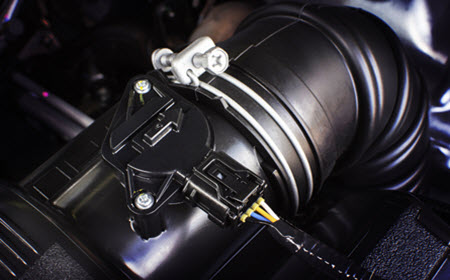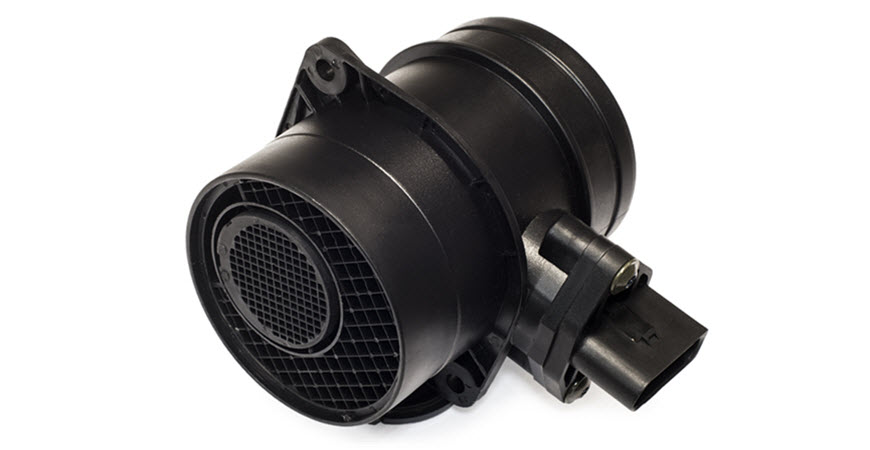A faulty or malfunctioning MAF (Mass Air Flow) sensor can cause several issues for your VW vehicle. As a passage for air that comes in via the air intake system, the MAF is responsible for monitoring air levels so the ECU can respond appropriately with air/fuel ratio adjustments. Too little or too much air can cause engine problems for your Volkswagen.
Many issues could arise with your MAF, and some of these are specific to Volkswagen models. Let’s take a look at some common issues with VW MAF sensors and how Denver’s best tire shop can help correct them.
Too Much Air and Not Enough Fuel
If your Volkswagen stalls often and acts like it won’t start, it may not be getting enough fuel. A malfunctioning MAF sensor may not assess the fuel and air ratio properly. This can lead to too much air entering the ECU and inhibiting proper adjustments.
For most VW vehicles, the perfect air-to-fuel ratio is 14.7:1, which is 14.7 parts air to 1 part gasoline. When this ratio is not maintained, your VW is unable to perform at its peak. When your air sensor is failing or on the verge of it, the right ratio can be nearly impossible to maintain.
Too Much Fuel and Not Enough Air
When your Volkswagen doesn’t get enough air and processes too much fuel, it is said to run rich. This is a direct cause in the reduction of fuel economy for Volkswagen vehicles, so it isn’t something you want to allow to continue indefinitely. Sometimes, a broken MAF sensor will cause this type of problem. Other times, it may simply be clogged with debris and need cleaning.
Types of Volkswagen MAF Sensors
Not every Volkswagen relies on the use of the same MAF sensor. Two main types of VW MAF sensors exist, which are known as the cold-wire& hot-wire versions. The main attributes of VW’s two MAF sensor types include:
- Cold Wire: This type is used to send ambient temperature information directly to the vehicle’s computer. This sensor is designed based on the concept of a negative temperature coefficient.
- Hot Wire: This type relies on a heated wire that is positioned in the airflow, which is heated by an electric current created by voltage. A drop in resistance allows a steady temperature to be maintained.
In addition to these variations in Volkswagen MAF sensors, there are two common types of MAF sensors currently in use. These consist of analog, which is known to produce a variable voltage output, and digital, which generates a frequency output. The operation of both types is similar.
Overall, if your MAF system fails it could lead to larger issues and more costly repairs for your Volkswagen. Yet, the key to proper service and repair is knowing which MAF your Volkswagen uses and what is required to properly fix it.
Visit DART auto for Your Volkswagen’s MAF Sensor Service and Repair
Serving the Englewood, Littleton, Centennial, and Denver, Colorado area for years, DART auto is committed to keeping your Volkswagen in top  running condition. This means tending to any MAF sensor issues that may arise. Keeping the best interests of our clients in mind, we take pride in the German auto repair services we have offered in the Denver area and surrounding cities for over 20 years.
running condition. This means tending to any MAF sensor issues that may arise. Keeping the best interests of our clients in mind, we take pride in the German auto repair services we have offered in the Denver area and surrounding cities for over 20 years.
Our staff is highly trained in the diagnosis of issues in your VW vehicle, inspection services to detect any safety or reliability concerns, and the detection of any dealer maintenance recommendations or requirements. These include recalls that could interfere with the safety of our clientele. We know what it means to make proper repairs to ensure the well-being of your vehicle and passengers, so at DART auto we get the job done right.
When you need to schedule an appointment for your VW, give us a call at 303-296-1188. We have convenient hours and helpful staff for timely and convenient scheduling. With specialty tools required for specific brands and available vehicles to keep you on the road, we have thought of everything that would be important to our customers seeking service for their VW vehicles. We look forward to helping you maintain your VW!
